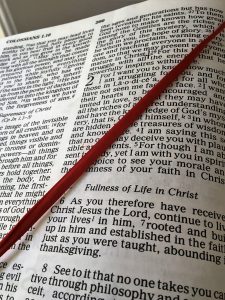 Where can I go from your Spirit? Where can I flee from your presence? If I go up to the heavens, you are there; if I make my bed in the depths, you are there. If I rise on the wings of the dawn, if I settle on the far side of the sea, even there your hand will guide me, your right hand will hold me fast (Psalm 139:7-10 NIV).
Where can I go from your Spirit? Where can I flee from your presence? If I go up to the heavens, you are there; if I make my bed in the depths, you are there. If I rise on the wings of the dawn, if I settle on the far side of the sea, even there your hand will guide me, your right hand will hold me fast (Psalm 139:7-10 NIV).
God is unlimited in regard to space, and, like time, he created it. In other words, God is omnipresent. He is bigger than space and encompasses it, and yet quite able to act to act within space. Since God is spirit, he is fully present in every place, though he does not manifest himself in all places in the same way. Though difficult to grasp, God clearly tells us this about his being (1 Kings 8:27; Psalm 139:7-10; Isaiah 40:12; Jeremiah 23:24; Acts 17:27-28; Ephesians 1:23). Listen to what some Christian teachers have said about this awesome truth as they attempted to explain it. “He is everywhere, i.e. his nature hath no bounds; he is not tied to any place, as the creature is, who, when he is present in one place, is absent from another. As no place can be without God, so no place can compass and contain him.” [Charnock, The Existence and Attributes of God, Vol. 1, p. 369]
“Space must have its limitations because its existence is commensurate only with the universe. Where there is no creation, there can be no space nor time. But creation cannot be infinite, but must have its bounds, impossible as it may be for us to imagine the non-existence of space. In our mode of existence, space and time are so necessary that we cannot even deny their existence without using words which involve that existence. Thus if we say, ‘Where there is no universe, there is no space,’ the very words ‘where’ and ‘there’ involve the notion of space… When, therefore, we speak of God’s immensity, we mean more than his filling all space, just as when we speak of his eternity, we mean more than his existing throughout all time” (Boyce, Abstract of Systematic Theology, p. 71). The Lord helps us to understand his immensity in regard to space in Isaiah 40:12, 15-17. God measures the heavens, which are incalculably large to us, by his hand. Whole nations of people are only “like a drop in a bucket”.
“God may be conceived of as present in any place, or with any creature, in several modes, first, as to his essence; second, as to his knowledge; third, as manifesting that presence to any intelligent creature; fourth, as exercising his power in any way in or upon the creature. As to essence and knowledge, his presence is the same everywhere and always. As to his self-manifestation and the exercise of his power, his presence differs endlessly in different cases in degree and mode. Thus God is present to the church as he is not to the world. Thus he is present in hell in the manifestation and execution of righteous wrath, while he is present in heaven in the manifestation and communication of gracious love and glory” (A.A. Hodge, Outlines of Theology, p. 108).
The doctrine of God’s omnipresence either produces fear or comfort or a mixture of both to all who think about it. To those who know not God, the very idea of the God of justice and power being present at all times and situations is terrifying. They are always in God’s presence; they cannot run away. But to those who know the Lord, this teaching gives great encouragement and hope. God, Father and Friend, is always near, though everyone else forsakes us. We can never be in a situation where the Lord is not close by to protect, to help, to comfort, and to cheer. Certainly, the reality that the Lord God is everywhere present, wherever we may go or we cannot presently go, should cause us to worship. “Lord, you are with our brothers and sisters in Christ around the world. Cause them to remember your glory. Refresh them with your love.”
Grace and peace, David

 Genesis 39:1-6
Genesis 39:1-6 Psalm 25:8-15
Psalm 25:8-15 The law of the Lord is perfect, refreshing the soul. The statutes of the Lord are trustworthy, making wise the simple. The precepts of the Lord are right, giving joy to the heart. The commands of the Lord are radiant, giving light to the eyes. The fear of the Lord is pure, enduring forever. The decrees of the Lord are firm, and all of them are righteous. They are more precious than gold, than much pure gold; they are sweeter than honey, than honey from the honeycomb. By them your servant is warned; in keeping them there is great reward (Psalm 19:7-11 NIV).
The law of the Lord is perfect, refreshing the soul. The statutes of the Lord are trustworthy, making wise the simple. The precepts of the Lord are right, giving joy to the heart. The commands of the Lord are radiant, giving light to the eyes. The fear of the Lord is pure, enduring forever. The decrees of the Lord are firm, and all of them are righteous. They are more precious than gold, than much pure gold; they are sweeter than honey, than honey from the honeycomb. By them your servant is warned; in keeping them there is great reward (Psalm 19:7-11 NIV). The eternal God is your refuge, and underneath are the everlasting arms (Deuteronomy 33:27a NIV).
The eternal God is your refuge, and underneath are the everlasting arms (Deuteronomy 33:27a NIV). When we read the Four Gospels, we should remember that the evangelists were not writing biographies. Their object was not to write a “life of Christ” but to tell the good news about Jesus the Messiah. As they wrote about the story of God’s glory in Christ, they chose events from his earthly ministry and selections from his words to display his glory that is good news for us. This knowledge will help us as we explore Matthew 8-9.
When we read the Four Gospels, we should remember that the evangelists were not writing biographies. Their object was not to write a “life of Christ” but to tell the good news about Jesus the Messiah. As they wrote about the story of God’s glory in Christ, they chose events from his earthly ministry and selections from his words to display his glory that is good news for us. This knowledge will help us as we explore Matthew 8-9. Genesis 37:29-36
Genesis 37:29-36  Matthew 5-7
Matthew 5-7 Genesis 1
Genesis 1 John 14:6-11
John 14:6-11